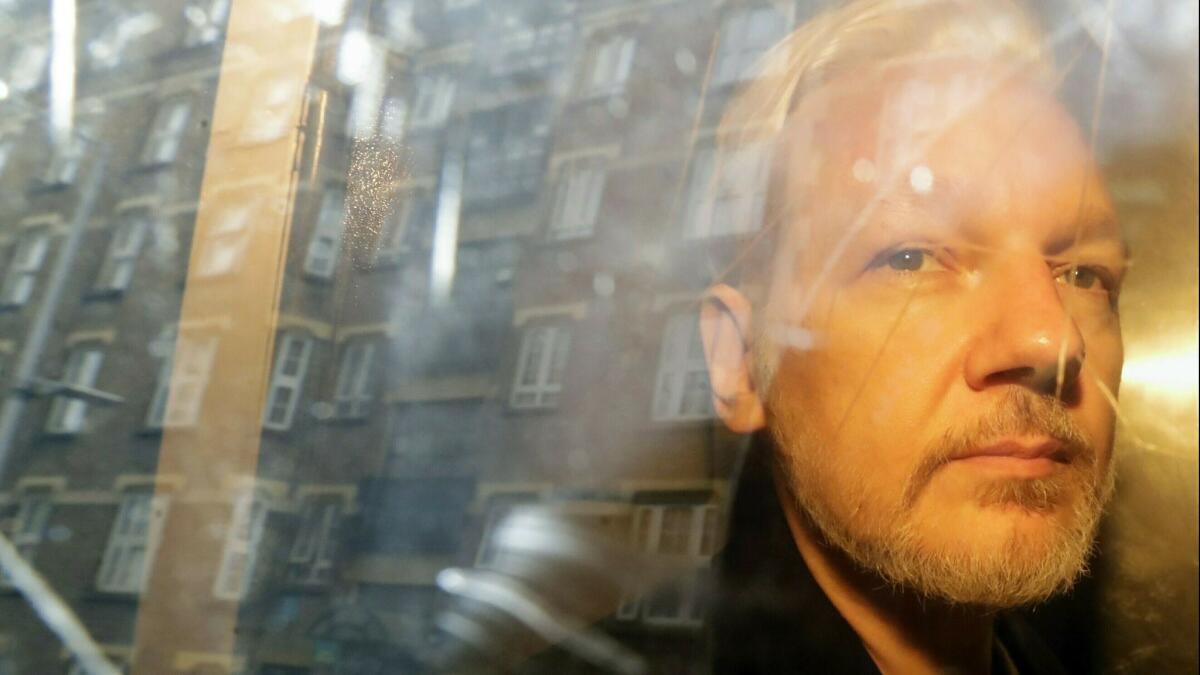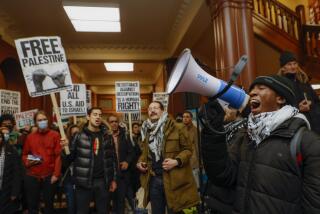Op-Ed: Harvard radicals, Julian Assange and the right to ‘liberate’ the mail of the ruling class

Fifty years ago this spring, Harvard students occupied the school’s administration building, demanding that the university end its complicity in the Vietnam War by kicking ROTC off campus. The student demands also included creating a black studies program and ending evictions of working-class people from property the university wanted to develop.
We didn’t realize at the time that we were also raising another issue that continues to resonate today: whether the 1st Amendment protects the publication of “stolen” documents — a question back in the headlines today with the Trump administration’s indictment of Julian Assange, publisher of WikiLeaks, for espionage.
In 1969, the building occupation ended when Harvard called in the police, who not only arrested the occupiers but also beat hundreds of students who came to see what was going on. After that, 10,000 students met at the stadium and voted to strike.
What the police and the administration didn’t know at the time was that, before leaving the building, one of the occupiers removed files from the office of the president and dropped them off outside the office of the Old Mole, a Cambridge underground newspaper (whose name came from Karl Marx: “Our old friend, our old mole, who knows so well how to burrow underground, suddenly to appear: the revolution”). I was a member of the Old Mole collective and a Harvard graduate student at the time.
Democracies require informed citizenries, because if people don’t know what officials are doing, they can’t lodge objections.
The trove included letters sent by Harvard Dean Franklin Ford to the college’s president, Nathan Pusey, and they documented the university’s ties to the CIA and the Pentagon. More important for the strike, however, was one letter from Ford to Pusey suggesting different strategies for undermining faculty support for ending ROTC. We decided to publish several of the “liberated” documents, under the triumphant title, “Reading the Mail of the Ruling Class.”
Many on the faculty were outraged at the dean, and soon ROTC left Harvard. But the mainstream media, led by the New York Times, denounced the Old Mole as “lawless” for publishing the purloined papers. There was a certain irony to that given that, just two years later, the New York Times published a different set of “stolen” documents. They called them “the Pentagon Papers.”
The documents obtained and published by the Times (as well as by other publications including this newspaper and the Washington Post) were a secret Defense Department history of the Vietnam War that had been copied by Daniel Ellsberg from files at the Rand Corp. in Santa Monica. The Nixon administration tried to stop publication, claiming it would “endanger national security,” and the Times went all the way to the Supreme Court arguing that the 1st Amendment protected its right to publish. The court ruled for the Times. (Nixon then went after Ellsberg, putting him on trial for “espionage,” but the charges were dismissed because of prosecutorial misconduct.)
Fifty years after the Old Mole controversy, debate over publishing stolen documents has been renewed with the Trump administration’s indictment Thursday of Assange on 17 counts of violating the Espionage Act. In 2010, WikiLeaks posted on its website devastating material that Army intelligence officer Chelsea Manning had copied from Iraq war logs and diplomatic documents, most notably video shot by American soldiers in an Apache helicopter in 2007 of them killing at least 18 civilians, including two Reuters journalists, on the streets of Iraq — something I believe should have been prosecuted as a war crime. The video made headlines around the world — including in the New York Times.
In 2013, Manning was sentenced to 35 years in prison for espionage. Obama commuted her sentence in January 2017. The Obama Justice Department never brought charges against Assange, after concluding that what WikiLeaks did was the same thing the New York Times had done in 1971 with the Pentagon Papers — and what news publications around the world do all the time: work with sources to publish documents the government would like to keep hidden.
Back in 1969 Harvard did not press charges against anyone for removing and publishing the files from University Hall. Donald Trump during the 2016 campaign was even more gleeful than we were back in 1969 about the publication of secret documents. “I love WikiLeaks!” he declared — because it published emails stolen from the Democratic National Committee.
The espionage charges against Assange on Thursday by Trump’s Justice Department are for the same acts that the Obama Justice Department considered and then decided against prosecuting. The new indictment alleges that Assange “repeatedly encouraged sources with access to classified information to steal it” and give it to WikiLeaks for publication. That’s a major escalation of the indictment brought by the government in April, which charged Assange only with conspiring with Manning to break into a government computer.
But both indictments describe similar acts, accusing Assange of having urged Manning to provide classified material and working with her to keep her identity secret — including helping Manning create a password that might preserve her anonymity while trying to get into an Army computer.
Enter the Fray: First takes on the news of the minute »
All that was public information back in 2011, when the Obama administration decided not to prosecute Assange. The April indictment claimed that “Assange actively encourag[ed] Manning to provide more information.” During an exchange, the indictment tells us, Manning told Assange that “after this upload, that’s all I really have got left.” Assange allegedly replied, “curious eyes never run dry in my experience.” But that’s not a crime — encouraging sources to get more information is something journalists do all the time.
At the Old Mole we argued that we had a right to publish those “liberated” documents under the 1st Amendment, and that the information they contained was important for the public to know. That’s not just a dated idea from the 1960s underground press. Democracies require informed citizenries, because if people don’t know what officials are doing, they can’t lodge objections. Sometimes that involves publishing classified information that has been leaked. As the Washington Post’s motto puts it: “Democracy dies in darkness.”
If the Trump administration succeeds in extraditing Julian Assange, the Supreme Court will eventually be asked to decide whether the ordinary news gathering process can be treated as espionage.
Jon Wiener is professor of history emeritus at UC Irvine and a contributing editor at The Nation, where he hosts the podcast “Start Making Sense.”
More to Read
A cure for the common opinion
Get thought-provoking perspectives with our weekly newsletter.
You may occasionally receive promotional content from the Los Angeles Times.






